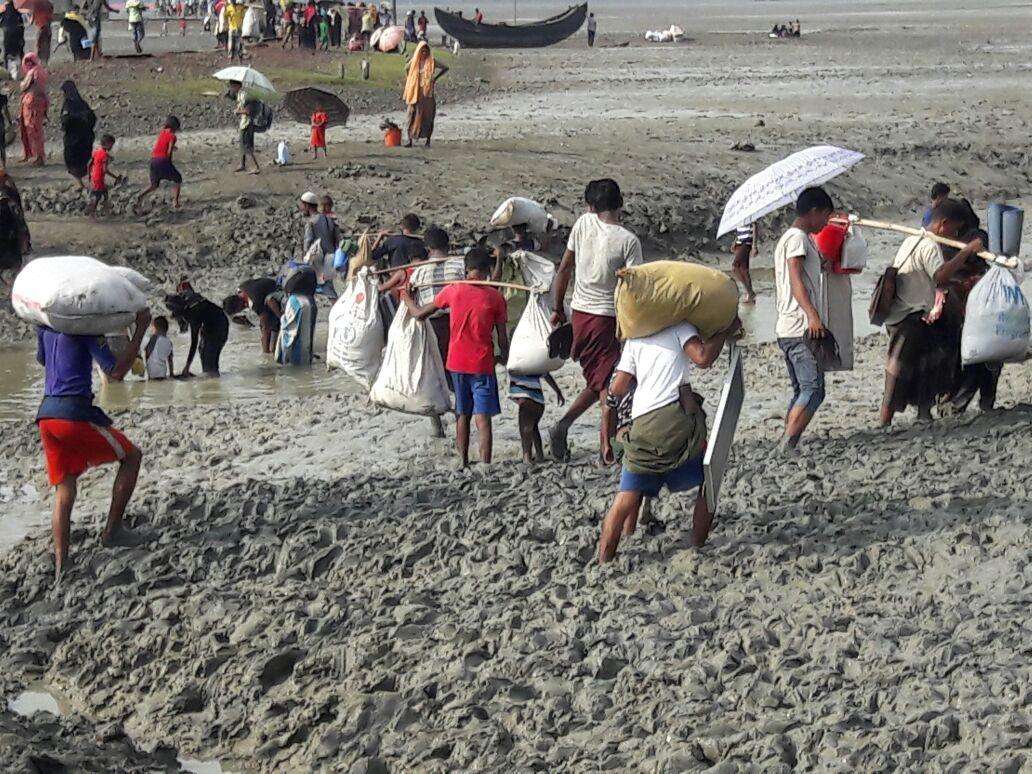Kutupalong, Bangladesh—Rohingya refugees who have fled to Bangladesh are in urgent need of medical and humanitarian assistance, as an already dire situation along the border with Myanmar worsens, said the international medical humanitarian organization Doctors Without Borders/Médecins Sans Frontières (MSF) Wednesday.
More than 146,000 people have crossed into Bangladesh in the past several days, fleeing violence in Rakhine state, Myanmar. This figure, in addition to the 75,000 people who have arrived since violence began in October 2016, represents one of the largest influxes ever of Rohingya into Bangladesh.
“We’ve not had something on this scale here in many years,” said Pavlo Kolovos, MSF head of mission in Bangladesh. “Our teams are seeing streams of people arriving destitute and extremely traumatized, and who have had no access to medical care. Many of the arrivals have serious medical needs, such as violence-related injuries, severely infected wounds, and advanced obstetric complications. Without a scale-up of humanitarian support, the potential health risks are extremely concerning.”
The majority of the new arrivals are now staying in existing makeshift settlements, UNHCR-registered camps, three new makeshift camps that have emerged, or among the host community. Many refugees are stranded in a no man’s land between the border with Myanmar. Even prior to the most recent influx, many Rohingya refugees in Bangladesh lived in unsafe, overcrowded and unhygienic conditions with little protection from the elements.
One 49-year-old father told MSF: “I fled home with my whole family, but my son was shot while running away. I brought him to the hospital here in Bangladesh, but left the other family members in the forest in Myanmar, in the open air, just hiding there. I haven’t heard from them for days now. I don’t know what to do, I feel so desperate.”
Additional nurses, midwives and doctors have been brought in to help respond, and MSF has set up a second inpatient ward at one of its two existing clinics in the Kutupalong area to accommodate the increase in patients. MSF also is supporting the increased referrals to other hospitals and providing round-the-clock ambulances to transport patients. Additionally two new mobile medical teams are assessing medical needs and treating the injured. MSF is also distributing essential items to the new arrivals.
MSF’s medical activities in Rakhine state in Myanmar have been on hold since mid-August due to a lack of travel authorization. This leaves thousands of patients in Rakhine with very limited or no access to health care, including chronic patients and emergency cases, said MSF.
“We are alarmed that hundreds of thousands of people still in Myanmar have no access to healthcare and that there are no actors currently able or allowed to respond on the ground,” said Kolovos. “As vaccination levels in Myanmar’s Northern Rakhine State are very low, one of the first priorities should be a scale-up of vaccination campaigns against measles and other diseases for new arrivals. More efforts are also needed to tackle high levels of malnutrition among the Rohingya already in Bangladesh preceding this influx, as well as those still in Rakhine state.”
Although there have been limited distributions of food, some refugees have only received dry biscuit rations and access to clean drinking water is a concern.
“I was given seven sachets of biscuits to feed my children when I arrived,” said a father of four who arrived three days ago. “That’s all they have eaten. We’re currently staying in a school with my family but the school committee said we have to leave tomorrow. I don’t know where we will go.”
More information about MSF operations in Bangladesh and Myanmar:
Bangladesh:
MSF first worked in Bangladesh in 1985. Close to the Kutupalong makeshift settlement in Cox’s Bazar district, MSF runs two clinics offering comprehensive basic and emergency healthcare, as well as inpatient and laboratory services to Rohingya refugees and the local community. In 2016, teams carried out 89,954 outpatient, 2,491 inpatient and 4,559 mental health consultations. They also treated 103 victims of sexual violence in 2016, more than double the number in 2015. In addition, 15,194 antenatal consultations were conducted.
MSF also works in Kamrangirchar slum, in the capital Dhaka, providing mental health, reproductive healthcare, family planning and antenatal consultations, as well as an occupational health program for factory workers.
Myanmar:
MSF has worked in Myanmar for 25 years, working with the Ministry of Health and Sports to provide care for HIV and tuberculosis (TB) patients, primary healthcare, and vaccinations.
In Rakhine State, Myanmar, MSF usually operates mobile clinics providing primary healthcare consultations in a number of villages and displaced population camps, and organizing emergency medical referrals to hospitals. MSF also usually supports the provision of HIV treatment in Ministry of Health & Sports hospitals in Northern Rakhine. In Central Rakhine, MSF also usually treats TB patients in cooperation with the National TB program.
Until mid-August, MSF was providing healthcare services in Pauktaw, Sittwe, Ponnagyun, Maungdaw, and Buthidaung townships. However, MSF’s medical activities in Rakhine state have been on hold since mid-August due to a lack of travel authorization. This leaves thousands of patients in Rakhine with very limited or no access to health care, including chronic patients and emergency cases. MSF continues to have a presence in Maungdaw.




